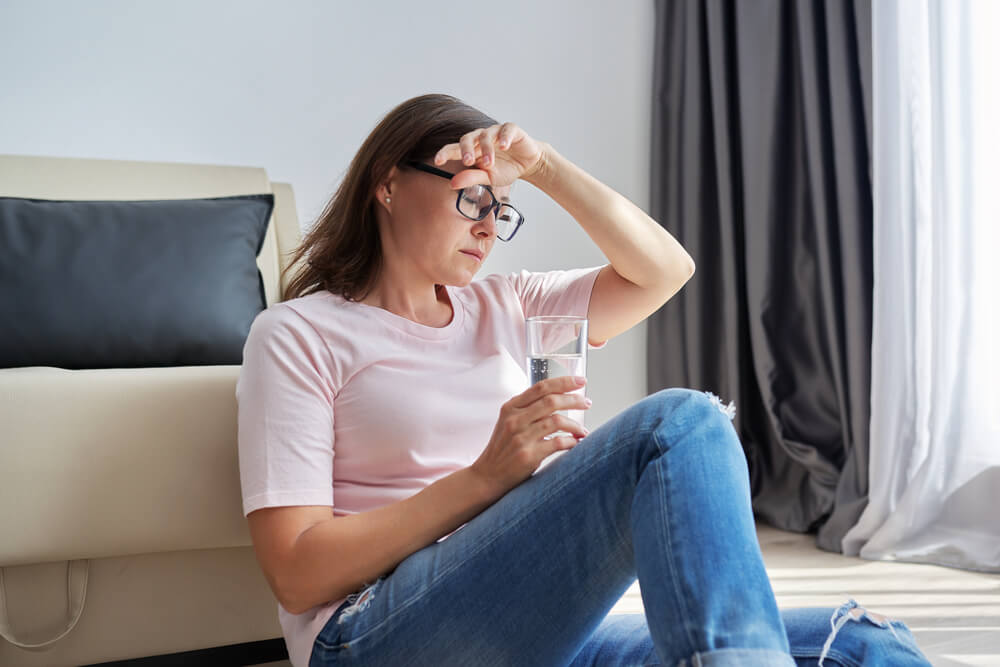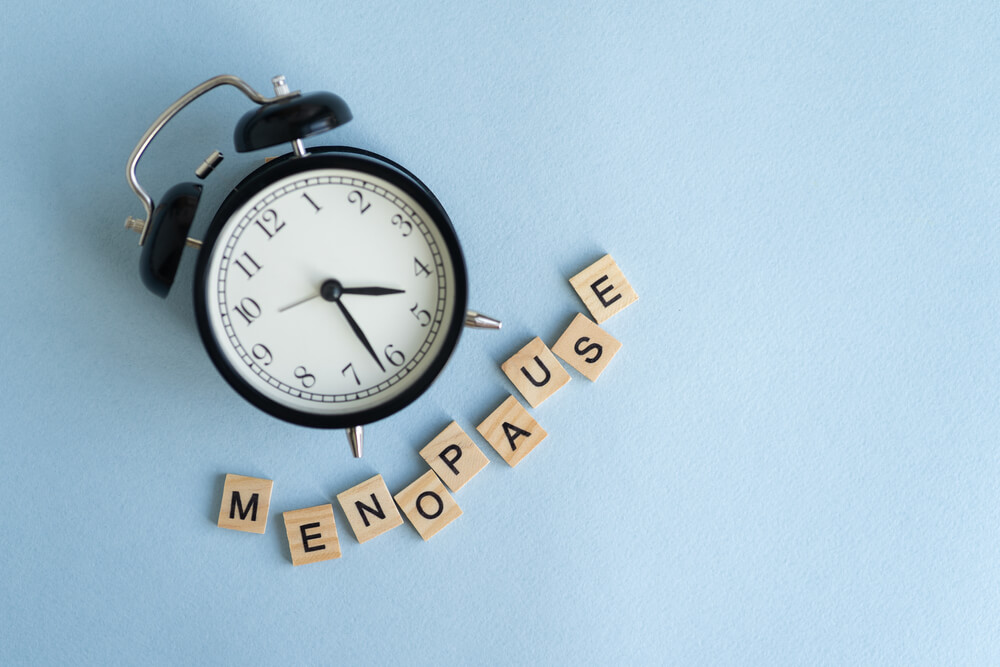Inevitably, all women will experience menopause as they age.
The body’s estrogen production gradually declines in your 40s, and eventually, you may stop having periods altogether. After a year without periods, a woman is considered to have permanently stopped menstruating.
Without medical intervention, we can identify three distinct stages of menopause: perimenopause, menopause, and postmenopause.
Perimenopause and menopause are often confused with one another. The transitional period between reproductive years is called perimenopause. Perimenopausal symptoms include night sweats, hot flashes, vaginal dryness, etc.
As you enter the perimenopausal stage, your body’s estrogen production gradually decreases. This lasts up to the last year or two before entering menopause, when your hormone levels drop drastically. The onset of perimenopause can occur as much as ten years before the onset of menopause. While most women don’t experience perimenopause until they’re in their 40s, it can start as early as their 30s.
If you haven’t had menstruation for 12 months, your doctor will probably conclude that you’ve entered menopause. The postmenopausal transition period begins after that.
“Sudden” menopause occurs in women who had their ovaries surgically removed.
Don’t hesitate to utilize expert gynecology services in Weston and Pembroke Pines if you have any questions or concerns about your gynecological health.
That said, if you want to learn more about menopause symptoms, how long menopause lasts when menopause ends, and more, keep reading.
Common Menopause Symptoms

Perimenopause is accompanied by many uncomfortable physical and emotional changes. During perimenopause and the transition to menopause, symptoms can occur more or less frequently and last for varying amounts of time in different women.
Both postmenopause and menopause symptoms can last for up to five years on average; however, they lessen in severity and frequency over time. Some women have reported a prolonged duration of symptoms.
Among the most typical signs and symptoms are:
- The dreaded hot flashes. These produce an immediate swell of heat throughout your upper body and face. They have varying durations, from a couple of seconds to a few minutes or more. A hot flash can happen once a day, once a week, or once a month.
- Breaking out in sweats during the night. Night sweats are a common symptom of nighttime hot flashes. In addition to waking you up, night sweats might leave you feeling drowsy all day.
- Cold flashes. After your body has cooled down following a hot flash, you may feel cold and start to shiver.
- Vaginal changes. Genitourinary syndrome (GSM) in menopause is characterized by vaginal dryness, sex discomfort, decreased libido, and an increased urge to pee.
- Emotional changes. The possible side effects include mild sadness, irritability, and mood swings. It’s important to let your doctor know if you start feeling depressed.
- Sleep disturbances. Night sweats are a common cause of sleep disorders, such as insomnia.
Some women have reported other symptoms as well, such as:
- Erratic heartbeat
- Joint and muscle pain
- Headaches
- Issues with memory and focus
- Hair thinning or hair loss
- Weight gain
You should see a doctor if you also suffer from any of the additionally reported symptoms, just to be safe. Feel free to contact Dr. Kompal Gadh for all your health needs.
During the first stages of menopause, you may encounter any of the mentioned symptoms. However, hot flashes are the most common during perimenopause.
How Long Does Menopause Last?
In most cases, perimenopausal symptoms might continue for up to four years. During menopause and postmenopause, you may notice a decrease in the symptoms.
So, when does menopause end? Essentially, after a year without menstruation, a woman is called postmenopausal.
Perimenopause is characterized by the onset of hot flashes. Hot flashes tend to last longer in African-American women and those of average body weight than in Caucasian and overweight women.
A woman can go through menopause before she turns 55. If a woman goes through menopause before she is 45, she is considered to have experienced early menopause. If you reach menopause before age 40, you have entered what is known as premature menopause.
Several causes can lead to early menopause. Surgery, such as a hysterectomy, might cause menopause early or prematurely in some women. Ovarian damage from chemotherapy or other medical procedures is another common cause.
Treatment Options for Menopause Symptoms
Although menopause is not a medical emergency, many women seek treatment to alleviate the unpleasant symptoms it might cause.
- Hormone replacement therapy: symptoms through all three stages of menopause, including hot flashes, can be alleviated with hormone replacement therapy (HRT). HRT does more than only ease hot flashes; it also protects against osteoporosis and bone loss. However, there is a slight chance of developing ovarian and breast cancer from using HRT. Because of this, medical professionals frequently recommend the lowest effective dose of estrogen to treat symptoms.
- Meds for hot flashes: treatment for hot flashes include low-dose antidepressants and certain anti-seizure meds. For some, antidepressants can help with the emotional shifts that come with menopause.
- Vaginal estrogen: direct vaginal application of estrogen is possible with a cream, a pill, or an implanted ring containing estrogen. This may help with vaginal dryness and pain during sex.
- Meds to fight osteoporosis: some physicians prescribe anti-osteoporosis drugs to their patients to offset the natural decline in bone mass during perimenopause and menopause.
When to Seek Help?

An irregular period is a natural part of the perimenopausal transition. However, infrequent menstrual periods can also be a symptom of cervical cancer or polycystic ovarian syndrome (PCOS). Check with your doctor to rule out other potential causes if you experience the following:
- Sudden heavy flows, possibly with blood clots
- Unusually long periods
- Bleeding/spotting in between periods
- Bleeding/spotting after sexual intercourse
- Two periods too close to one another
Menopause increases the long-term chance of developing osteoporosis and cardiovascular disease. Both disorders are more likely to occur if estrogen is lacking in the body. This is because estrogen helps keep your bones and heart healthy.
Because menopause can make your urethra dry, irritable, or inflamed, you are also more likely to get urinary tract infections. And because of the change in vaginal moisture and thickness, you may also experience an increase in vaginal infections.
Make sure your doctor knows if you’re experiencing menopause symptoms, especially if they’re severe.
To Conclude
When compared to your reproductive years, life after menopause is remarkably similar. Eat well, get plenty of exercises, and schedule regular checkups with your doctor, dentist, and optometrist.
The onset and duration of menopause symptoms vary from woman to woman. The duration of these symptoms is typically around seven years, beginning in the early stages of perimenopause and continuing into postmenopause.
Maintaining healthy bones is possible through regular exercise, a healthy diet, and frequent doctor visits, all of which work together to detect and treat issues before they become serious.
If you have started noticing anything unusual about your gynecological health or simply wish to schedule a regular checkup, you’re welcome to contact us at Advanced OBGYN Institute.






